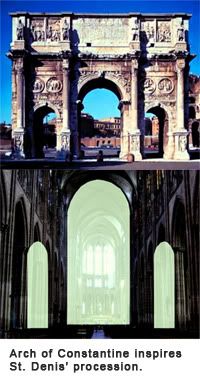| A study from the University of Notre Dame finds that the human mind compartmentalizes memories according to rooms and different spaces.
The passage through doorways causes a lapse in memory. As you walk from one room to another room, the brain tries to adjust to a new series of memories and episodes. Each room is associated with events and activities that are particular for each room.
The brain files away these activities and their associated spaces into different places, and the transition between these places in the brain associates with the doorway transition between rooms. |
|
|
The significance of doorways was understood by Egyptians, Greeks and other ancient cultures. Vitrivius laid down specific modular forms for doorways, according to the proportion and architectural style of spaces. The function of spaces further influenced the doorway apertures. Passage through the arch of triumph meant a new page in Rome’s history. The compartmentalization of memories was used to separate activities, but also to map out the collective human experience in the building. It was a means of making the building a model of the human mind.
|
Religious structure of Egyptian temples placed heavy importance on doorways, as they symbolized the passing of one spiritual state to another. The solstice sun shone on Abu Simbel’s inmost sanctuary to symbolize the glorification of Pharoah. Passage under the lintels into a new concentric circle at Stonehenge similarly meant a change.
As architects program spaces and consider the circulation between functional spaces, it is vital for them to holistically consider the meaning of passage between these spaces. Children, who as of yet are not programmed to think of spaces as separate functions, will always choose the path that is more interesting. Ever wonder why a child will choose to trample through the leaves rather than walk on the sidewalk? The individual spaces are fairly easy to make sense of, but the challenge is to tie everything together. Architecture can help map out the individual events of life and make sense of everything as a unified whole. It is innate human nature to seek the more interesting path. The passage between spaces should be the greatest event in the building- yet it rarely is. The doorway should be the greatest contradiction and complexity- yet when is that ever the case?
|
|
 |
(featured images by D Coetzee on flickr/creative commons)


